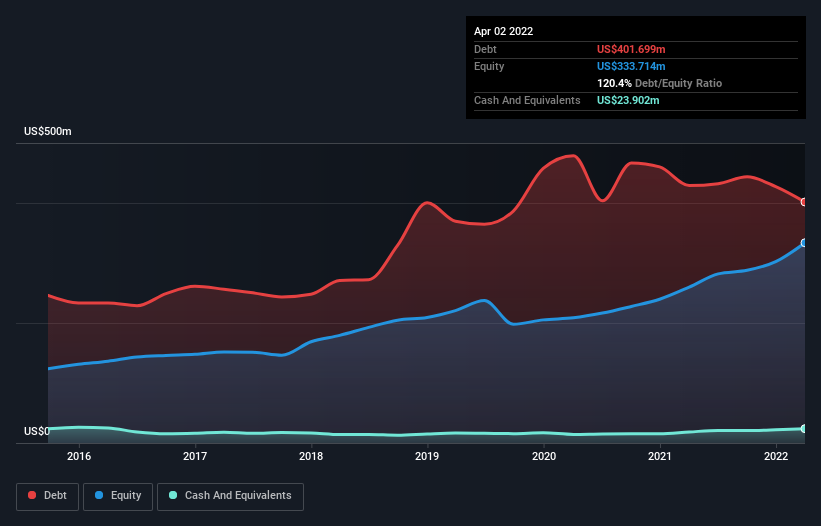- United States
- /
- Transportation
- /
- NasdaqGS:ULH
Universal Logistics Holdings (NASDAQ:ULH) Has A Pretty Healthy Balance Sheet

David Iben put it well when he said, 'Volatility is not a risk we care about. What we care about is avoiding the permanent loss of capital.' So it seems the smart money knows that debt - which is usually involved in bankruptcies - is a very important factor, when you assess how risky a company is. We can see that Universal Logistics Holdings, Inc. (NASDAQ:ULH) does use debt in its business. But the more important question is: how much risk is that debt creating?
When Is Debt A Problem?
Generally speaking, debt only becomes a real problem when a company can't easily pay it off, either by raising capital or with its own cash flow. Part and parcel of capitalism is the process of 'creative destruction' where failed businesses are mercilessly liquidated by their bankers. However, a more common (but still painful) scenario is that it has to raise new equity capital at a low price, thus permanently diluting shareholders. By replacing dilution, though, debt can be an extremely good tool for businesses that need capital to invest in growth at high rates of return. The first step when considering a company's debt levels is to consider its cash and debt together.
Check out our latest analysis for Universal Logistics Holdings
What Is Universal Logistics Holdings's Net Debt?
The image below, which you can click on for greater detail, shows that Universal Logistics Holdings had debt of US$401.7m at the end of April 2022, a reduction from US$429.0m over a year. However, it does have US$23.9m in cash offsetting this, leading to net debt of about US$377.8m.

A Look At Universal Logistics Holdings' Liabilities
Zooming in on the latest balance sheet data, we can see that Universal Logistics Holdings had liabilities of US$355.8m due within 12 months and liabilities of US$499.6m due beyond that. On the other hand, it had cash of US$23.9m and US$425.8m worth of receivables due within a year. So its liabilities outweigh the sum of its cash and (near-term) receivables by US$405.7m.
This is a mountain of leverage relative to its market capitalization of US$656.7m. This suggests shareholders would be heavily diluted if the company needed to shore up its balance sheet in a hurry.
We use two main ratios to inform us about debt levels relative to earnings. The first is net debt divided by earnings before interest, tax, depreciation, and amortization (EBITDA), while the second is how many times its earnings before interest and tax (EBIT) covers its interest expense (or its interest cover, for short). Thus we consider debt relative to earnings both with and without depreciation and amortization expenses.
Universal Logistics Holdings's net debt to EBITDA ratio of about 1.9 suggests only moderate use of debt. And its strong interest cover of 11.9 times, makes us even more comfortable. It is well worth noting that Universal Logistics Holdings's EBIT shot up like bamboo after rain, gaining 48% in the last twelve months. That'll make it easier to manage its debt. The balance sheet is clearly the area to focus on when you are analysing debt. But it is future earnings, more than anything, that will determine Universal Logistics Holdings's ability to maintain a healthy balance sheet going forward. So if you're focused on the future you can check out this free report showing analyst profit forecasts.
Finally, while the tax-man may adore accounting profits, lenders only accept cold hard cash. So the logical step is to look at the proportion of that EBIT that is matched by actual free cash flow. Looking at the most recent three years, Universal Logistics Holdings recorded free cash flow of 32% of its EBIT, which is weaker than we'd expect. That's not great, when it comes to paying down debt.
Our View
Universal Logistics Holdings's EBIT growth rate was a real positive on this analysis, as was its interest cover. Having said that, its level of total liabilities somewhat sensitizes us to potential future risks to the balance sheet. When we consider all the elements mentioned above, it seems to us that Universal Logistics Holdings is managing its debt quite well. But a word of caution: we think debt levels are high enough to justify ongoing monitoring. There's no doubt that we learn most about debt from the balance sheet. However, not all investment risk resides within the balance sheet - far from it. For example, we've discovered 2 warning signs for Universal Logistics Holdings that you should be aware of before investing here.
At the end of the day, it's often better to focus on companies that are free from net debt. You can access our special list of such companies (all with a track record of profit growth). It's free.
New: AI Stock Screener & Alerts
Our new AI Stock Screener scans the market every day to uncover opportunities.
• Dividend Powerhouses (3%+ Yield)
• Undervalued Small Caps with Insider Buying
• High growth Tech and AI Companies
Or build your own from over 50 metrics.
Have feedback on this article? Concerned about the content? Get in touch with us directly. Alternatively, email editorial-team (at) simplywallst.com.
This article by Simply Wall St is general in nature. We provide commentary based on historical data and analyst forecasts only using an unbiased methodology and our articles are not intended to be financial advice. It does not constitute a recommendation to buy or sell any stock, and does not take account of your objectives, or your financial situation. We aim to bring you long-term focused analysis driven by fundamental data. Note that our analysis may not factor in the latest price-sensitive company announcements or qualitative material. Simply Wall St has no position in any stocks mentioned.
About NasdaqGS:ULH
Universal Logistics Holdings
Provides transportation and logistics solutions in the United States, Mexico, Canada, and Colombia.
Good value with proven track record.

